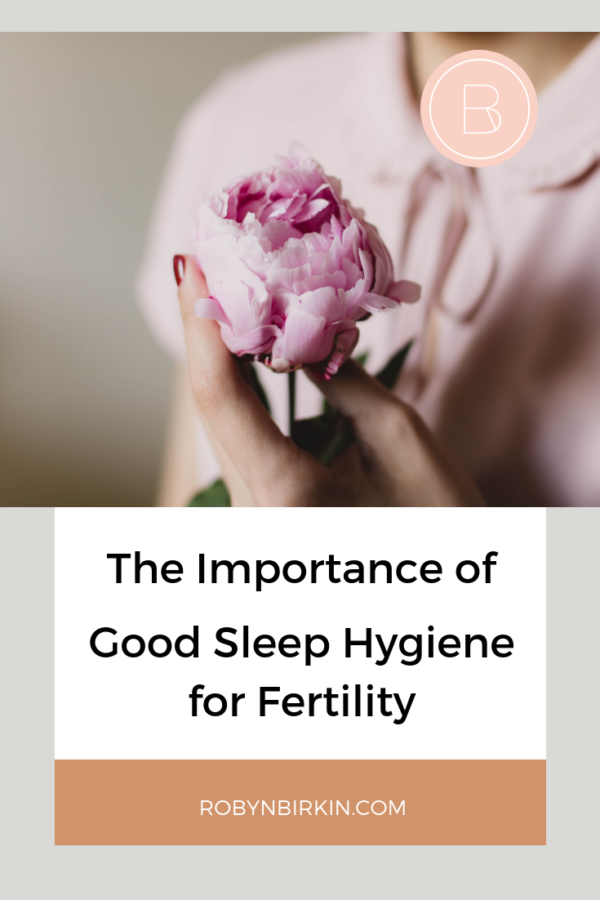Not many people know just how big of a deal sleep is when it comes to fertility. Sleep is actually a bit of a secret weapon in our fight against infertility.
This is one area where my husband really annoys me. He puts his head on the pillow falls asleep right away, and he doesn’t wake up easily. It’s so annoying because I am the type of person who takes a long time to fall asleep. In my head I need to download every single thing that has happened over the course of the day, and then I’m a really light sleeper. It really annoys me that he’s the opposite.
I don’t know if you can relate, but sleep is one of the most precious things in my life, and I work really hard to get a good night’s sleep, because it doesn’t come easily to me. And in the context of your fertility, sleep is a bit of a secret weapon. Not many people know just how big a deal sleep is when it comes to infertility, and fertility generally.
WHY IS SLEEP IMPORTANT?
Lack of sleep, not getting enough sleep, results in higher levels of depression and anxiety. It has many effects in the brain, such as decreasing the brain’s neurotransmitters, that can result in higher levels of depression and anxiety. Studies have also shown that people who are lacking in sleep cry more readily, especially at night.
Maybe you can relate – on your fertility journey, that you cry at the drop of a hat. But lack of sleep also triggers a stress response in our body, and stress response. We can often think of a stress response, in some ways, as fight or flight, when our bodies are in fight mode. Sometimes, a lack of sleep also triggers a stress response, so we have certain stress hormones in our body. One of them is cortisol, and when we have a lack of sleep, certain stress responses are released in our body, and that can really impair fertility as well. The opposite of fight or flight mode rest, repair, reproduce, and digest. When you are in fight or flight mode, your body switches off things like your digestion and your fertility.
When we are sleep deprived, we’re hungrier, and we crave more things like carbs and salty foods. Even just a week of impaired sleep can really trigger inflammation, stress responses, and really impact our immune system.
That’s why sleep is such a secret weapon – it can affect so many things.
THE CONNECTION BETWEEN STRESS, ADRENAL FATIGUE AND FERTILITY
SHOUTOUT TO SHIFT WORKERS
Things are even harder for shift workers, who work a variable schedule and don’t sleep at the same times each day. A lot of my tips for sound sleep are things that you can do even if the times that you are going to sleep are a bit different.
Obviously, if you can be rostered on for all day shifts, and really start to regulate your sleep and wake cycles, and your circadian rhythm, that’s obviously optimal.
ESTABLISH YOUR ROUTINE
The number one thing that you want to do when you are trying to encourage a good night’s sleep is routine. You want to have the same, or at least similar, routine every night before you go to sleep. Start the routine ideally about 20 minutes (or even more) before you go to sleep. Things like brushing your teeth before bed (Please tell me that you brush your teeth before you go to bed). Washing your face. What other things do you do right before you go to bed? Those things all form your routine, and that’s really important. If your routine doesn’t take 20 minutes, if you can, try to work out what kind of things you might do to really get your body understanding in its subconscious that “Now it’s time for us to go to sleep.”
What you also want to do is have a routine that is filled with things that are going to help you get to sleep, not things that are going to take away from you going to sleep. For example, if 20 minutes before you went to sleep you were out late with your girlfriends, came home and you’re buzzing – Those are the kind of things that you don’t want to do, ideally, before sleep. Another example – don’t go for a big, giant, hard workout and then try to go straight to sleep.
no blue screens
If you’re struggling with sleep, don’t watch TV right before bed. Don’t look at your phone right before bed. These are called blue screens or blue light. They say that you should have about an hour or two hours to kind of decompress from that, and the reason for that is because it affects the melatonin levels in our body, The screens can essentially simulate sunlight, which then sends a signal to our brains that it’s still daytime and not sleep time, and you really want to have a routine that gets you ready for sleep, not one that’s hard-wired to keep you awake.
So what kind of positive things would you build into your routine?
take a shower or bath
One of the reasons that it is so beneficial to bathe or shower before bed is because when we fall asleep, our body temperature slightly decreases. The warm shower starts to trigger your body temperature to cool down, which can really help you before you fall asleep.
WIND DOWN BEFORE BED
Something that is really beneficial is to sit and unwind somehow before bed. Some people journal. Journals can help you reflect on the day, and can also facilitate a brain dump, where you release whatever is in your mind to paper. Is it a to-do list? Is it something that really annoyed you today? Is it something that you need to do tomorrow? Just write in your journal for about five minutes, just to get it out of your head, so you’re not sat there and repeating it over and over again in your head before you go to sleep.
Another way to unwind is to listen to a meditation. You can also lie down with your legs up the wall for about 10 minutes. It’s really helpful to get to sleep, so lie down, legs up the wall, for about 10 minutes, maybe listening to a meditation at the same time. These are all really positive things that will help you calm down, help regulate your body temperature to go to sleep.
FREE GUIDED MEDITATION FOR FERTILITY WARRIORS
CREATE YOUR IDEAL SLEEP ENVIRONMENT
DARK, cool ROOM
So what kind of sleep environment do you need? Ideally, it will be a dark room. If you need, get blackout blinds, particularly if you’re a shift worker. , and by dark, I mean like really dark, so get blackout blinds if you need, particularly if you’re a shift worker. You can get blackout blinds that can help block a lot of the light, and it’s the exact opposite to effect of blue screens, where it helps simulate to your body that it’s time to go to sleep.
You also ideally want your room to be fairly cool. Imagine what it’s like when you go to sleep and it’s a bit cold outside, but you’re all super cozy and snug in your bed and feeling really snug in your bed. That’s ideally what you want. You want the temperature to ideally be quite cool but you to be nice, and snug, and warm.
WHITE NOISE
Some people sleep better with white noise, such as the hum of a fan. There is a great app called Sleepy Sounds, which is wonderful, and that will just play for you on repeat until you switch them off. Other people need some silence. Experiment and see what works for you.
DITCH THE PHONE
When going to sleep please put your phone on airplane mode. We don’t know what effect the technology has on our bodies. We are living in a world where there are microwaves, and phone waves, and wifi in our houses constantly. It’s fine to put your phone at your bedside, on silent. You might even switch off the notifications, with those flashing lights, so that they don’t tempt you. Please put your phone on airplane mode, so that then you do not have any of these electromagnetic frequencies floating around right near your head, when you are trying to sleep, and you are not getting notifications that will tempt you. If you need to have your phone on, please leave it out in the kitchen or in another room to charge, so that it’s not right near your bedside and keeping you up at night.
EAT EARLIER
Try to have an earlier dinner so that you leave a gap between dinner and falling asleep. It takes your body a lot of energy to digest your food, so that gap gives your body enough time to digest the food and then start preparing for sleep, rather than trying to burn all of this energy right when you’re trying to go to sleep.
NO COFFEE RIGHT BEFORE BED
Ideally, when trying to conceive, it’s preferable to cut out coffee altogether. Sometimes that’s not possible, so what you would want to do is at least keep your coffees to before 10:00 AM, so that they’re not affecting you later on in the day. I try to drink a maximum of either a 10 ounce or 12 ounce coffee per day, before 10 AM.
HOW I TAILORED THE FERTILITY DIET TO SUIT MY BODY
NO DAYTIME NAPS
Don’t nap during the day. It’s tempting, particularly on the weekends, to just have a nap because you can. My strong advice is to not nap during the day. If you feel a bit tired, go for a walk in the fresh air rather than going for a nap, or drink some water. Often, when we feel hungry, or tired, or sick, it’s a sign of dehydration, so a glass of really cold water can be all that we really need.
THE POWER OF APPLE CIDER VINEGAR
Finally, if you can’t get to sleep, try drinking a little bit of apple cider vinegar with honey in warm water. This helps calm your body and get ready for sleep. Don’t forget – when you buy apple cider vinegar, you want the apple cider vinegar that has like all the cloudy, murky stuff in it, because that means it’s the good stuff. So just have a little bit of apple cider vinegar with a little bit of honey, to just help calm your body and get it ready for sleep.
Sleep is really important, not just for our fertility, but for our overall health. There are so many elements of our health that are impacted by our sleep or a lack thereof, so please prioritize your sleep, Let me know if you’ve implemented some of these things and if it has made a difference.

